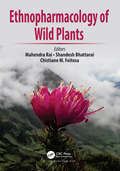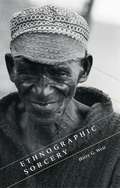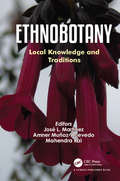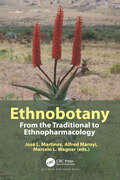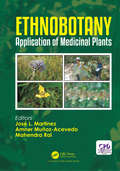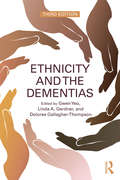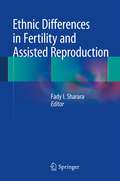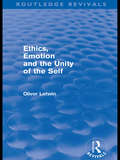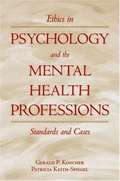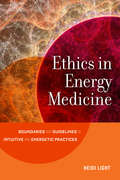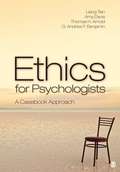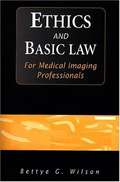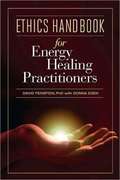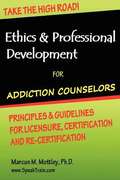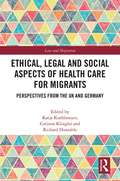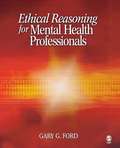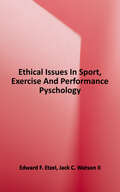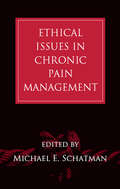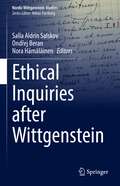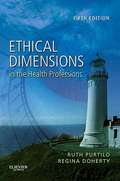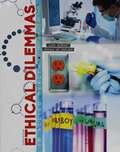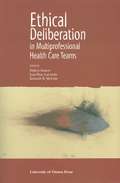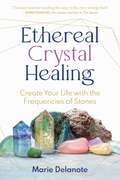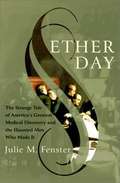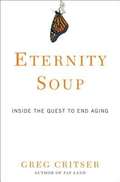- Table View
- List View
Ethnopharmacology of Wild Plants
by Mahendra Rai; Shandesh Bhattarai; Chistiane M. FeitosaThe book provides valuable information on wild plants and their ethnopharmacological properties, discussion on ethnobotany, phytotherapy, diversity, chemical and pharmacological properties including antifungal, anti-inflammatory and antiprotozal properties. The chapters include a wide range of case studies, giving updated evidence on importance of wild plant resources from different countries including Nepal, India, Brazil, Chile, Argentina, Colombia, Egypt, Peru, etc. In addition, some specific species are used to explain their potential properties. Discussing traditional usage and pharmacological properties of wild plants, this book is entirely different from other related publications and useful for the researchers working in the areas of conservation biology, botany, ethnobiology, ethnopharmacology, policy making, etc.
Ethnographic Sorcery
by Harry G. WestAccording to the people of the Mueda plateau in northern Mozambique, sorcerers remake the world by asserting the authority of their own imaginative visions of it. While conducting research among these Muedans, anthropologist Harry G. West made a revealing discovery---for many of them, West's efforts to elaborate an ethnographic vision of their world was itself a form of sorcery. In Ethnographic Sorcery, West explores the fascinating issues provoked by this equation. A key theme of West's research into sorcery is that one sorcerer's claims can be challenged or reversed by other sorcerers. After West's attempt to construct a metaphorical interpretation of Muedan assertions that the lions prowling their villages are fabricated by sorcerers is disputed by his Muedan research collaborators, West realized that ethnography and sorcery indeed have much in common. Rather than abandoning ethnography, West draws inspiration from this connection, arguing that anthropologists, along with the people they study, can scarcely avoid interpreting the world they inhabit, and that we are all, inescapably, ethnographic sorcerers.
Ethnobotany: Local Knowledge and Traditions
by Mahendra Rai Jose L. Martinez Amner Munoz-AcevedoEthnobotany: Local Knowledge and Traditions discusses various plants that have actually been used in traditional medicine for a specific ailment. It desribes the biological effectiveness (activities) related to each "sickness" which have been scientifically verified. This book will also discuss the bioactivities established/determined that are promising and have potential. Finally, this book will be an appropriate consultation tool for scientists/professionals/experts such as ethnobotanists, botanists, cell/molecular biologists, chemists, pharmacists, pharmacologists, environmentalists/ecologists.
Ethnobotany: From the Traditional to Ethnopharmacology
by José L. Martinez Alfred Maroyi Marcelo L. WagnerIn this book we present recent studies that have been carried out on some widely used medicinal plants. The need for new and alternative treatments stem from the lack of efficiency of existing remedies for certain illnesses. We have compiled information that may be useful to researchers in their quest to develop new drugs.
Ethnobotany: Application of Medicinal Plants
by Mahendra Rai José L. Martinez Amner Muñoz-AcevedoEthnobotany includes the traditional use of plants in different fields like medicine and agriculture. This book incorporates important studies based on ethnobotany of different geographic zones. The book covers medicinaland aromatic plants, ethnopharmacology, bioactive molecules, plants used in cancer, hypertension, disorders of the central nervous system, and also as antipsoriatic, antibacterial, antioxidant, antiurolithiatic. The book will be useful for a diverse group of readers including plant scientists, pharmacologists, clinicians, herbalists, natural therapy experts, chemists, microbiologists, NGOs and those who are interested in traditional therapies.
Ethnicity and the Dementias (Third Edition)
by Gwen Yeo Linda A. Gerdner Dolores Gallagher-Thompson<p>In recent years, the literature on the topic of ethnic and racial issues in Alzheimer’s disease and other dementias has increased dramatically. At the same time, the need for cultural competence in all of geriatric care, including dementia care, is increasingly being acknowledged. Dementia is a large societal problem affecting all communities, regardless of race or ethnicity, and understanding dementia for specific groups is tremendously important for both clinical knowledge and for health planning as a nation. <p>This third edition of Ethnicity and the Dementias offers invaluable background information in this area, while also examining how those suffering from dementia and their family members respond or adapt to the challenges that follow. Thoroughly updated and revised throughout, the book features contributions from leading clinicians and researchers in the field, with particular attention given to genetic and cultural factors related to dementia, effective prevention and treatment strategies, and issues in caregiving and family support. Chapters offer specific recommendations for dementia care in 11 ethnic/racial groups, as well as suggestions for working effectively with LGBTQ+ families. <p>Providing a truly comprehensive resource on ethnicity and dementia, and including reflections on emerging trends and the future of caregiving, this new edition is ideal reading for clinicians, educators, researchers, policy makers, and families, in search of the most current ethnogeriatric findings.</p>
Ethnic Differences in Fertility and Assisted Reproduction
by Fady I. ShararaOver the past 10 years, studies have shown that the rates of fertility vary in different ethnic groups. Ethnic differences also play a significant role in the outcome of assisted reproductive technology (ART) cycles. In the United States, minority groups--African Americans, Hispanics (mainly Mexicans and Central Americans), East Asians (Chinese, Japanese, Koreans, Philippinos) and South Asians (Indians, Pakistanis, and Bengalis)--have significantly lower chances of live births compared to Caucasian women. Birth outcome data collected by the Society for Assisted Reproductive Technology shows a worsening trend in conception rates between the years 1999-2000 and 2004-2006, raising more concern that the disparity in fertility rates between minority groups and white women is widening over time. This comprehensive book serves to answer the questions that arise when managing infertility in a multi-ethnic population. An expert assembly of key leaders in the field of reproductive medicine imparts insight and clinical experience in order to identify and analyze the possible causes of racial disparities in fertility outcome. Some of the reviewed causes include higher Body Mass Index (BMI), tubal diseases, metabolic syndrome, and fibroids in African Americans; tubal disease and higher early pregnancy loss in Hispanics; higher incidence of diminished ovarian reserve and lower BMI in East Asians; and higher incidence of polycystic ovarian disease (PCOS) in South Asians. The book also provides a review of data on access to care and ART services in developing countries. A thoughtful combination of evidence-based medicine and advanced treatment options, this book is sure to distinguish itself as the definitive reference on ethnic differences in assisted reproduction.
Ethics, Emotion and the Unity of the Self (Routledge Revivals)
by Oliver LetwinThis Routledge Revival reissues Oliver Letwin’s philosophical treatise: Ethics, Emotion and the Unity of the Self, first published in 1987, which concerns the applicability of the artistic classifications of romanticism and classicism to philosophical doctrine. Dr Letwin examines three particular theses associated with philosophical romanticism: that there is within us a high self and a low self; that there is a moral self in inevitable conflict with an amoral self; and that there is a rational self disjoined from and in tension with a passionate self. He argues that these notions of philosophical romanticism are, in fact, radically false, and instead takes the view that man can be a unified being of the sort described by philosophical classicists. But man has to work to achieve this status. The intrinsic unity of the human personality is not a guarantee of a coherent life, but a challenge to be met.
Ethics in Psychology and the Mental Health Professions: Standards and Cases (3rd edition)
by Patricia Keith-Spiegel Gerald P. KoocherWe seek to present the full range of contemporary ethical issues in the mental health professions, not only as relevant and intriguing but also as integral and unavoidable aspects of the our complex professional roles and social responsibilities. Regardless of one's training speciality or the work setting, critical dilemmas will arise -- probably with some regularity--and we will often need to make challenging decisions or take intervention steps, sometimes right on the spot.
Ethics in Energy Medicine: Boundaries and Guidelines for Intuitive and Energetic Practices
by Heidi LightThe first guidebook to discuss the full scope of the intuitive process and propose structures to keep practitioners and clients safeHeidi Light, a family counselor and certified hypnotherapist, asserts that we are in desperate need of guidance and standards so that we can approach the world of intuition, energy, and mysticism from a healthy and respectful place. Drawing from her more than forty years as a medical intuitive, empath, and energy tracker—as well as twenty years as a counselor in private, clinical, and institutional settings—Light offers practical, simple solutions to the alarming lack of boundaries in the fields of intuition and energy medicine. From massage therapists who just throw in a little extra energy work, to psychics who read your sister instead of you, or to practitioners who tell you to take off your clothes, Light shares case studies and vignettes of ethical boundaries mistakenly being crossed. This book explains the traditional psychological model of ethics that counselors and psychologists are taught and outlines an ethical energetics model as a framework for moving through the process of accessing intuitive information and working with energy. Experienced energy workers, those new to the field and just opening to their intuition, and those who come to them for services need to know these ethical guidelines of boundaries and consent.
Ethics for Psychologists: A Casebook Approach
by Liang Tien Amy Davis Thomas H. Arnold Andrew F. BenjaminEthics for Psychologists provides unique multicultural, moral, and legal perspectives to the standards of conduct in the field of psychology. The book describes complex ethical dilemmas students may encounter and offers a variety of frameworks through which to examine such dilemmas.
Ethics and Basic Law for Medical Imaging Professionals
by Bettye G. WilsonComplies with ASRT curriculum guidelines requiring coverage of ethical theory, behavior, and dilemmas; legal responsibilities; and patient consent. Provides coverage of special issues, such as the impaired colleague and special patient populations, including the terminally ill patient and the patient with an infectious disease. Discussion questions facilitate classroom discussion and student analysis. Each chapter includes objectives and an end-of-chapter summary.
Ethics Handbook For Energy Healing Practitioners
by David FeinsteinEthical principles are far more than mere rules or regulations - they are maps for bringing out your best as a caregiver and healer. Responding to a lack of articulated or standardized ethical guidelines for energy healing practitioners, David Feinstein, PhD, and Donna Eden developed a professional curriculum that has become one of the country's most successful and effective energy medicine certification programs. Now, this comprehensive, case-oriented guide allows veterans of the field and newcomers alike to work through a wide range of ethical dilemmas before they arise, helping you to prevent professional errors that could hurt you, your clients, and your practice.
Ethics And Professional Development For Addiction Counselors: Principles, Guidelines And Issues For Training, Licensing, Certification And Re-certification
by Marcus MottleyIn Ethics & Professional Development for Addiction Counselors, Dr. Marcus Mottley defines and clarifies a wide number of ethical issues and dilemmas involving conflicts of interest, boundary issues, confidentiality, professional behaviors and the core obligations, roles and responsibilities of addiction counselors. Addiction professionals who use this book will become highly aware of their own values, attitudes and behaviors and how these might impact their professional conduct and their relationships with clients. Counselors will also gain insights and get clarification on key topics such as documentation, self-disclosure, dual relationships, cultural competence and HIPAA guidelines. Ethics & Professional Development for Addiction Counselors is a concise manual that includes the twelve principles of ethics, eleven principles of professional development and key guidelines, issues and information that are part of the core knowledge requirements for the licensing, certification and re-certification of addiction counselors. Ethics & Professional Development is a precise, no fluff, get-right-to-the-point guide, reference and training manual for counselors, therapists, healthcare professionals and others interested in the field of addictions and the treatment of alcoholism and drug use.
Ethical, Legal and Social Aspects of Healthcare for Migrants: Perspectives from the UK and Germany (Law and Migration)
by Richard Huxtable Katja Kuehlmeyer Corinna KlinglerNumerous important issues arise in relation to the health of, and healthcare for (and by), migrants. Much commentary on the migrant crisis and healthcare has focused on the allocation of resources, with less discussion of the needs of, and provision for, migrants. Presenting a comparative perspective on the UK and Germany, this volume increases knowledge of a broad spectrum of challenges in healthcare provision for migrants. ‘Migration’ is deliberately understood in its broadest sense and includes not only migrant patients but also migrant healthcare professionals. The book’s content is diverse, with insights from healthcare ethics, healthcare law, along with clinical perspectives as well as perspectives from the social sciences. The collection provides normative reflections on current issues, and presents data from empirical studies. By informing researchers, politicians and healthcare practitioners about approaches to challenges arising in healthcare provision for migrants, the collection seeks to inform the development of adequate and ethically appropriate strategies.
Ethical Reasoning for Mental Health Professionals
by Gary G. FordThe definition of ethics and how to apply it to the mental health profession.
Ethical Issues in Sport, Exercise, and Performance Psychology
by Edward Etzel Jack C. WatsonThis book focuses attention on the range of unique ethical, legal, and related professional challenges faced by those who work in the areas of sport, exercise, and performance psychology. Ethical Issues in Sport, Exercise, and Performance Psychology is organized into four sections: ethical practices, specific populations, special settings, and academic issues. Professionals in higher education, university counseling centers, sports medicine clinics, and private practice, as well as students, will find this book an informative personal resource.
Ethical Issues in Chronic Pain Management (Pain Management Ser. #Vol. 1)
by Michael E. SchatmanSpecifically designed to address the needs of all specialists involved in the care of chronic pain patients, this source clarifies the ethical and legal issues associated with the diagnosis, assessment, and care of patients suffering from long-term pain. Divided into five comprehensive sections, this source covers a variety of topics to help the ch
Ethical Inquiries after Wittgenstein (Nordic Wittgenstein Studies #8)
by Nora Hämäläinen Ondřej Beran Salla Aldrin SalskovThis volume showcases contemporary, ground-up ethical essays in the tradition of Wittgenstein’s broader philosophy and Wittgenstein-inspired ethical reflection. It takes the ethical relevance of Wittgenstein as a substantial and solid starting point for a broad range of ongoing thinking about contemporary ethical issues.The texts are organised in two sections. The first consists of chapters exploring questions around what could be called the “grammar” of our moral forms of life, and thus represents a more traditional approach in ethics after Wittgenstein. The second part represents a recent turn in the tradition towards investigating moral conceptions, perspectives and concepts that are undergoing change, either because the world itself is changing (for instance with new technologies) or because human agency, such as social movements, has brought us to reconsider previously unquestioned ideas and structures.Within the book, the authors’ contributions are inspired, in their ways of working with ethical questions, by Wittgenstein’s conceptions of language, understanding and the nature of philosophical inquiry. This book is of interest to philosophers influenced by Wittgenstein, as well as to all ethicists seeking ideas for how to do philosophy in a manner close to lived experience and practice.
Ethical Dimensions in the Health Professions
by Ruth B. Purtilo Regina F. DohertyIdeal for all health care professionals, Ethical Dimensions in the Health Professions, 5th Edition provides a solid foundation in basic ethical theory, the terms and concepts of ethics, and current ethical issues. Expert authors Ruth Purtilo and Regina Doherty outline a unique 6-step decision-making process as a guide to making effective choices that lead to a professional and caring response to patients. They also suggest practical approaches to commonly encountered clinical issues such as confidentiality, informed consent, information sharing, and end-of-life care. With this book, you will develop the skills you need to recognize, understand, and resolve ethical problems.
Ethical Dilemmas in Allied Health
by Janine M IdziakOver the past several decades, health care ethics has developed and flourished as an academic discipline. The field now includes a standard set of topics. Issues such as abortion, assisted reproduction, terminating life-sustaining treatment, euthanasia and physician aid-in-dying, confidentiality, and the allocation of scarce medical resources are commonly covered in textbooks on health care ethics. However, the perspective assumed in these textbooks may be limited in com¬parison with the actual range of health care services and types of health care professionals. Case studies on ethical dilemmas typically focus on physicians and nurses in a hospital setting. This textbook, on the other hand, approaches the standard problems of health care ethics from the perspective of the allied health fields. Case studies always involve allied health professionals, giving recognition to them as an integral part of the care giving team.
Ethical Deliberation in Multiprofessional Health Care Teams
by Hubert Doucet Jean-Marc Larouche Kenneth R. MelchinThis study analyzes both pragmatic and theoretical perspectives of ethical deliberation, as well as the professional and philosophical backgrounds for the ethical deliberation of social workers, nurses and doctors working in the field of chronic illness. In doing so, this volume expands the scope of current research through an analysis of the process and its dynamics.
Ethereal Crystal Healing: Create Your Life with the Frequencies of Stones
by Marie Delanote• Shares practical and powerful energy work and attunement techniques for working with the energies of crystals whether they are physically present or not as well as how to create ethereal gem elixirs for specific healing and manifestation goals• Explores the healing and creative powers of 33 ethereal crystals, including Kirlian photography of their auras• Explains how to use ethereal crystal healing practices to heal the body, heal animals, improve relationships, and manifest abundance and successSimilar to remote energy healing, working with the ethereal energy of a crystal allows you to engage with highly potent crystal frequencies anywhere, without the need to have the crystal physically at hand. Stones in their nonphysical form are said to have an even stronger energetic effect than physical crystals.In this illustrated guide, master teacher Marie Delanote discusses the healing and creative powers of 33 ethereal crystals, detailing best uses from career support to health issues and emotional cleansing. Gemstones are imbued with palpable energy whose frequencies can be intuited, felt, and tuned in to. Sharing practical and powerful energy work and attunement techniques, Marie explains how to connect with and invoke these frequencies. Ethereal crystal healing practices can be employed to raise your consciousness, heal animals, cleanse the energies of buildings, improve relationships, and heal the body also through direct energetic interaction with the internal organs. Inspiring examples highlight how these energies can help transform thinking patterns, physical issues and illnesses, emotional pain, family patterns, as well as generational trauma.Presenting a unique energetic method for personal transformation, Ethereal Crystal Healing will teach you how to heal, how to change, and how to manifest your desires.
Ether Day: The Strange Tale of America's Greatest Medical Discovery and the Haunted Men Who Made it
by Julie M. FensterEther Day is the unpredictable story of America's first major scientific discovery -- the use of anesthesia -- told in an absorbing narrative that traces the dawn of modern surgery through the lives of three extraordinary men. Ironically, the "discovery" was really no discovery at all: Ether and nitrous oxide had been known for more than forty years to cause insensitivity to pain, yet, with names like "laughing gas, " they were used almost solely for entertainment. Meanwhile, patients still underwent operations during which they saw, heard, and felt every cut the surgeon made. The image of a grim and grisly operating room, like the one in Mary Shelley's Frankenstein, was in fact starkly accurate in portraying the conditions of surgery before anesthesia. With hope for relief seemingly long gone, the breakthrough finally came about by means of a combination of coincidence and character, as a cunning Boston dentist crossed paths with an inventive colleague from Hartford and a brilliant Harvard-trained physician. William Morton, Horace Wells, and Charles Jackson: a con man, a dreamer, and an intellectual. Though Wells was crushed by derision when he tried to introduce anesthetics, Morton prevailed, with help from Jackson. The result was Ether Day, October 16, 1846, celebrated around the world. By that point, though, no honor was enough. Ether Day was not only the dawn of modern surgery, but the beginning of commercialized medicine as well, as Morton patented the
Eternity Soup: Inside the Quest to End Aging
by Greg CritserMix the latest and most rigorous scientific research, irrepressible old-fashioned entrepreneurship, and the ancient human desire to live forever (or at least a lot longer) and the result is today's exploding multibillion-dollar antiaging industry. Its achievements are so far mostly marginal, but its promises flow with all the allure of a twenty-first-century fountain of youth. In Eternity Soup, acclaimed science writer Greg Critser takes us to every outpost of the antiaging landscape, home to zealots and skeptics, charlatans, and ingenious clinicians and academics. We visit a conference of the Caloric Restriction Society, whose members-inspired by certain laboratory findings involving mice-live their lives in a state just above starvation. ("It's only the first five years that are uncomfortable," says one. ) We meet the new wave of pharmacists who are reviving the erstwhile art of "compoundingr"using mortar and pestle to mix extravagantly profitable potions for aging boomers seeking to recapture flagging sexual vitality. Here, too, are the theorists and researchers who are seeking to understand the cellular-level causes of senescence and aging and others who say, Why bother with that? Instead, we should just learn how to repair and replace organs and tissue that break down, like a vintage automobile collector who keeps a century-old Model T shining and running like new. Eternity Soupis a simmering brew of testosterone patches, human growth hormone (so promising and so potentially dangerous), theories that view aging as a curable disease, laboratory-grown replacement organs ("I want to build a kidney," says one proponent. "It is such a stup-eed organ!"), and bountiful other troubling, hilarious, and invigorating ingredients. Critser finds plenty of chicanery and credulousness in the antiaging realm but also a surprising degree of optimism, even among some formerly sober skeptics, that we may indeed be on the cusp of something big. And that elicits its own new set of concerns: How will our society cope with a projected new cohort of a million healthy centenarian Americans? How will they liberate themselves from the age segregation that shunts them off to "Godr"s Waiting Rooms"in the sunbelt? Where will they find joy and meaning to match the inevitable loss that comes with longevity? Eternity Soup is an illuminating, wry, and provocative consideration of a long-dreamed-about world that may now be becoming a reality.
